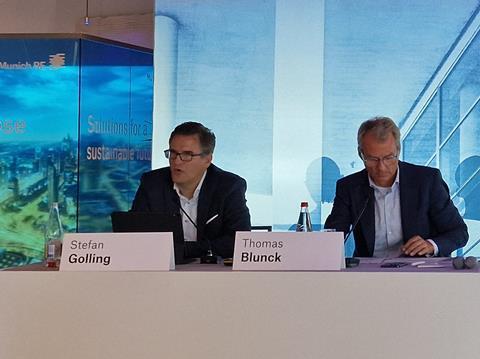Reinsurers should “stop fooling ourselves” about rate improvements in US casualty business, when this is being more than cancelled out by higher claims activity, Munich Re warned at its RVS 2024 briefing.

Problems in US casualty business formed a central note of caution at Munich Re’s press conference held in Monte Carlo today (8 September) at the Rendez-Vous de Septembre (RVS 2024).
Munich Re analysis revealed many years in which rate development has not kept pace with claims inflation in the US.
“The only area where we more cautious at the moment is casualty, specifically US liability. And we have no problem to give up volume if we see that the terms and conditions are insufficient,” said Stefan Golling, member of the board of management, Munich Re.
He pointed to reserve strengthening in US liability in recent years, a trend he said continues into earnings calls in the first two quarters of 2024.
“Let’s be honest, our industry can’t be proud about this,” Golling said.
“We obviously, clearly failed in assessing the claims and inflation trends properly. We as an industry have been too optimistic,” he said.
Due to the long-tail nature of the business, insufficient rates can impact profitability for several years, Munich Re observed.
In US liability business, verdicts are awarding higher damages – social inflation – a development that is also benefiting specialised lawyers and litigation funders, but spells trouble for reinsurance business, the reinsurer highlighted.
“It’s not only about the famous social inflation, or as we like to call it, the legal system abuse,” Golling said.
“I think we were also too optimistic about simply assessing and estimating the underlying normal trend inflation. On top, I think we tolerated a soft market in the US market for far too long,” he continued.
This situation “cannot continue” on excess US casualty business, and will “need to improve…whether we participate or not”, Golling warned.
Golling revealed Munich Re was moving to reduce the weight of this underpriced business in its book, only backing disciplined carriers that were transparent and “properly reporting” risk-adjusted rates.
“After every crisis, this industry reacts with very strong rate increases, limits management and so on, but then also falls very quickly back into the habit of ignoring or underestimating exposure and claims trends, not necessarily by aggressively pushing the rates down, but simply not keeping the rates up in line with the exposure trends – and we need to avoid that,” he said.
“We have no problem to give up volume, and, honestly, reinsurers are part of that problem,” Golling said.
He noted headlines from reinsurers citing improved rates, despite these being more than cancelled out by higher claims activity.
“We need to stop fooling ourselves,” he added.
One swallow does not make a summer
“The general message is that the market is in a good balance, in a stable state,” said Thomas Blunck, member of the board of management, Munich Re.
However, he said macroeconomic uncertainties “could have an impact” on reinsurance.
The first of these, he suggested, was that GDP had not reached pre pandemic levels, and that the US Federal Reserve is considering an interest rate cut, focused on avoiding recession.
Inflation is falling to around 2%, he noted, but that for reinsurance business, some sectors show different inflation patters – pinpointing construction materials, medical inflation, public injury and the care sector.
Industry return on equity had been poor, on balance, in recent years, he emphasised, with just one very good year, two other good, and four bad years.
“One swallow does not make a summer,” he warned.
He disagreed with broker Gallagher Re’s more upbeat analysis, suggesting the performance was inadequate to appeal to capital markets and in the interest of shareholders.
“I think we have to keep up our return of equity to be attracted for the capital market, and that is not so easy,” Blunck said.
He repeated the concern about a return to lower interest rates, affecting risk capital and investment performance.
“So the core message is, after core performance and looking forward, we had better not to rely on just the assets performing nicely and maybe even subsidising some underwriting. No, it’s really the underwriting that has to perform very well in our core business,” Blunck added.
Golling reinforced the cautious view, countering the rate adequacy on the property side with more negative factors.
“I think we are far away from a super hard market,” Golling said.
“It’s a favourable market, a disciplined market, but we are not at all in a super hard market where you could simply accept blindly any kind of risk that is presented to you, or where you could simply aim for growth. I think if you, if you think you can do that, it will fail very quickly,” he added.










No comments yet